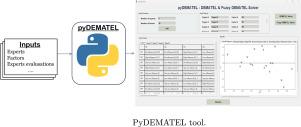PyDEMATEL: A Python-based tool implementing DEMATEL and fuzzy DEMATEL methods for improved decision making
IF 2.4
4区 计算机科学
Q2 COMPUTER SCIENCE, SOFTWARE ENGINEERING
引用次数: 0
Abstract
In the context of decision-making, the DEMATEL (Decision Making Trial and Evaluation Laboratory) method stands out for its systematic approach to complex systems. By incorporating fuzzy logic, the DEMATEL fuzzy method takes traditional techniques a step further, effectively managing the uncertainties and imprecision inherent in expert assessments. This hybrid method has proved useful in a variety of fields, including business, engineering, healthcare, environmental management, and education. Its ability to refine subjective judgments into actionable information enables decision-makers to improve organizational performance, optimize resource allocation, and achieve more accurate results. The development of software tools for these methods makes them more accessible and practical, enabling more effective analysis and application. In this paper, we propose a flexible implementation that integrates seamlessly into Python-based applications, offering full access to all parameters, matrices, and intermediary calculations of the method. Additionally, the tool also provides a user-friendly graphical interface.

PyDEMATEL:基于 Python 的工具,用于实施 DEMATEL 和模糊 DEMATEL 方法以改进决策制定
在决策方面,DEMATEL(决策试验和评估实验室)方法因其针对复杂系统的系统方法而脱颖而出。通过结合模糊逻辑,DEMATEL 模糊法将传统技术向前推进了一步,有效地管理了专家评估中固有的不确定性和不精确性。事实证明,这种混合方法在商业、工程、医疗保健、环境管理和教育等多个领域都非常有用。它能够将主观判断细化为可操作的信息,使决策者能够提高组织绩效、优化资源配置并取得更准确的结果。这些方法的软件工具的开发使其更易于使用和实用,从而实现更有效的分析和应用。在本文中,我们提出了一种灵活的实现方法,可无缝集成到基于 Python 的应用程序中,提供对该方法所有参数、矩阵和中间计算的完全访问。此外,该工具还提供了友好的图形界面。
本文章由计算机程序翻译,如有差异,请以英文原文为准。
求助全文
约1分钟内获得全文
求助全文
来源期刊

SoftwareX
COMPUTER SCIENCE, SOFTWARE ENGINEERING-
CiteScore
5.50
自引率
2.90%
发文量
184
审稿时长
9 weeks
期刊介绍:
SoftwareX aims to acknowledge the impact of software on today''s research practice, and on new scientific discoveries in almost all research domains. SoftwareX also aims to stress the importance of the software developers who are, in part, responsible for this impact. To this end, SoftwareX aims to support publication of research software in such a way that: The software is given a stamp of scientific relevance, and provided with a peer-reviewed recognition of scientific impact; The software developers are given the credits they deserve; The software is citable, allowing traditional metrics of scientific excellence to apply; The academic career paths of software developers are supported rather than hindered; The software is publicly available for inspection, validation, and re-use. Above all, SoftwareX aims to inform researchers about software applications, tools and libraries with a (proven) potential to impact the process of scientific discovery in various domains. The journal is multidisciplinary and accepts submissions from within and across subject domains such as those represented within the broad thematic areas below: Mathematical and Physical Sciences; Environmental Sciences; Medical and Biological Sciences; Humanities, Arts and Social Sciences. Originating from these broad thematic areas, the journal also welcomes submissions of software that works in cross cutting thematic areas, such as citizen science, cybersecurity, digital economy, energy, global resource stewardship, health and wellbeing, etcetera. SoftwareX specifically aims to accept submissions representing domain-independent software that may impact more than one research domain.
 求助内容:
求助内容: 应助结果提醒方式:
应助结果提醒方式:


